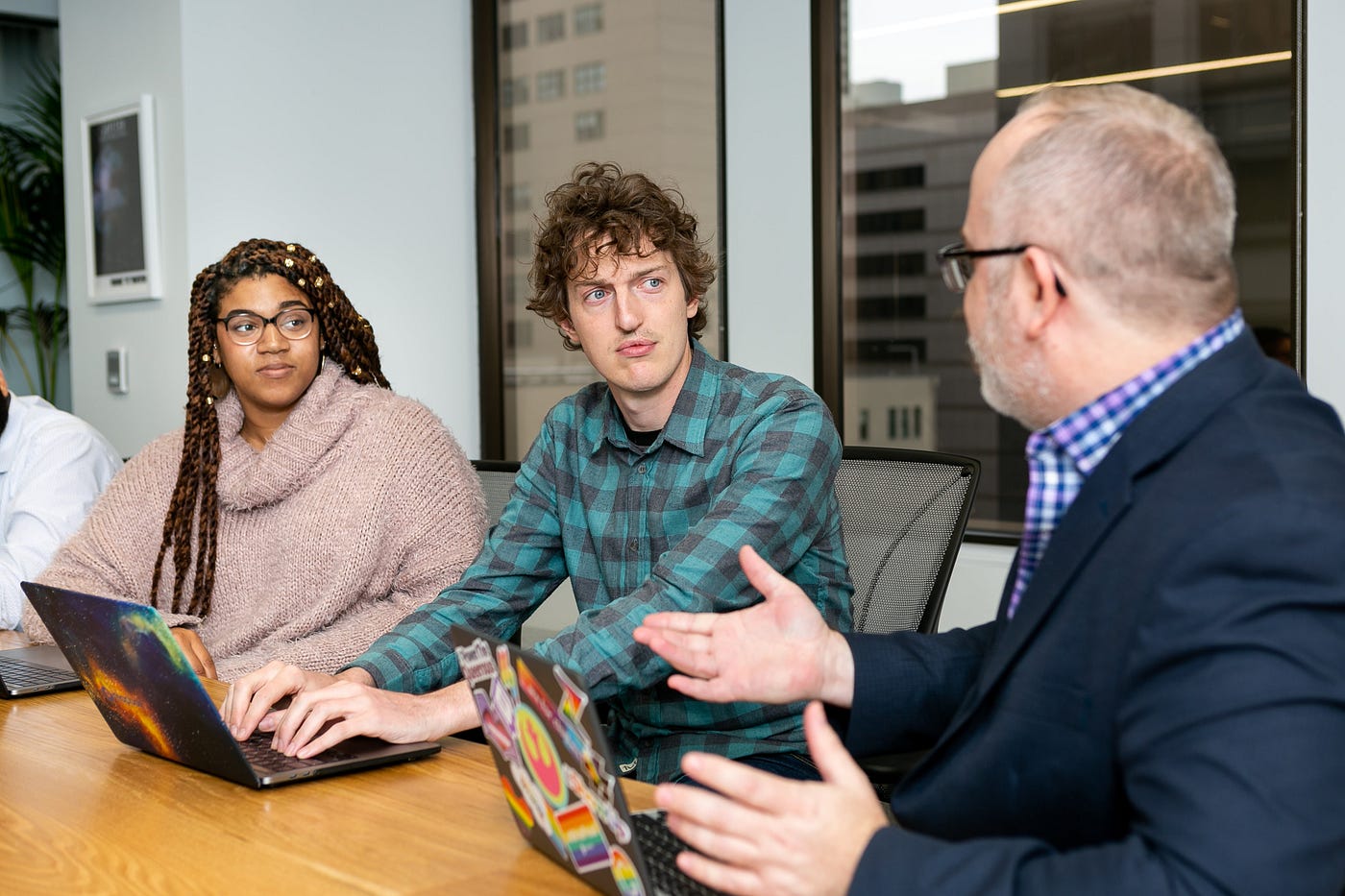Age is often seen as a disadvantage, sometimes even a grounds for discrimination: you’re too young and inexperienced, you’re too old and rigid, you’re too expensive, too slow… A lot of assumptions can be made about people based on their age, and we often forget how much we actually get to learn from each other!
Our blogger Wambui, who grew up in Kenya and now lives and studies in Ghent, wrote a piece about what she’s learned about age gaps in the workplace, and the benefits of creating age diversity on the work floor.

I was born and raised in Kenya: I grew up in the city with my family, and during school holidays, I would visit my grandparents in the countryside for extended periods of time. There, I learnt how to work on simple tasks such as planting crops and raising animals, bright and early in the morning. Back in the city, I learnt work ethic from my parents, who were committed to demanding yet fulfilling careers.
I grew up with an appreciation of hard work and a healthy work-life balance. Kenyans are very hardworking people for the most part, and as a nation, Kenya still undergoes challenges of unemployment and irresponsible leadership. It can be quite difficult for those dealt a tough hand in life because it requires substantial will power to overcome these life issues, especially financially. Youth employment, in developing nations like mine, is challenging to acquire due to systemic issues which are not aligned with resources. This means that the number of people seeking fair employment exceeds the capacity of available and suitable resources.
In Kenya, the common working age is around 21, during the last year of college or later after graduation. Some others start working even earlier, if college is not their plan, or reach in small scale jobs that have the potential for growth in the product supply industries.

My first work experiences
Higher education in Kenya is seen as a stepping stone to a well-paying job, but a basic degree is not sufficient, and there is a lot of competition in the job market. I always wanted to go to college, but once I finished high school, I had to wait a year before joining, so I started looking for temporary opportunities for the gap year. I was 17, I wanted to gain independence and start adulting. My first job was in a shoe shop as a marketeer and saleswoman: to this day, I know how to assess the quality of a shoe based on material and sturdiness, and the size. I also worked with older people (25–45 years) building their careers, so I was among the youngest workers at the company. I stayed there for about one year, then I went to college.
During my studies, I worked as a part-time research assistant for about two years. The research focused on using solar energy in water purification in areas that do not have clean and filtered waters in Nairobi, the capital city. It was a fulfilling project especially when I saw how effective and economical solar energy (a natural and free energy source) can be in solving a problem of everyday life (water is life!). I learnt how academia works, especially in a public institution with individuals much older than myself.
The main things I learnt from this job were patience and diligence, considering the generational gap between myself and my boss. I also gained confidence in talking to members of the research community. I must say that working from a young age is extremely beneficial for personal development: the way I view work and building assets as an adult, still today, was strongly influenced by my first work placements.
While in college, I also volunteered in student organisations related to community service and environmental awareness. When I graduated, I worked temporarily in a public office as an administrative assistant. There, I learnt the nature of government employment which involved multiple levels of bureaucracy. I interacted with people from all walks of life, and I developed empathy for the citizens I served. I worked for a few months, then I joined a research government organisation to build my career.

Workplace dynamics between young and matured workers
In my own work experiences, I’ve observed that both generations have things to teach and learn from each other.
The older workers can teach youngsters things based on their experience, such as “hard times don’t last but tough people do”. They have been through financial depressions and successes, an experience they can prepare younger people for by telling them what they wish they knew back then. Older colleagues value loyalty and commitment to their jobs and careers, an important perspective for younger colleagues who tend to change jobs very quickly. Moreover, older colleagues have a great understanding of what they regret in their career choices and can pass the lessons along.
My older colleagues knew the ropes in the workplace: they could help see the big picture and provide important navigation tools. For the most part, they were social individuals, more skilled at one-on-one relationships: they could help younger colleagues with interpersonal skills, which are critical to both personal and professional growth. Independence is another life lesson I gained earlier on: my elders taught me to take care of myself without being a burden, and to know when to ask for help.
But younger workers can contribute a lot as well: for example, I was able to help my older colleagues with new technology such as computers and mobile phones. I also gave them new perspectives: oftentimes, the older employees would see career change as negative, while us youngsters understand it as energizing and fulfilling.
The differences between work cultures in Kenya and Belgium
The biggest difference in work culture between both countries lies in the work-life balance: Kenyans are considered the heartbeat of the East African region, and that requires an extremely hardworking labor force to keep the economy running. This translates to a burnt out working population. Belgium, in contrast, encourages a work-life balance and has a medical, social and financial support system available.
Like most West European countries, Belgium is able to support its citizens no matter their financial situations. Kenyans do not have the luxury to depend on state resources, since each working person is expected to develop an individual retirement plan, business/side hustle or other multiple income streams to maintain a good living standard in the long run.
Another difference in work culture is the nature of jobs. In Belgium, most jobs are considered equitable and compensated for. In Kenya, there is much more emphasis on higher education, and high flying careers are placed as expectations for all school-going children. This marginalises people who are gifted in non-academic skills. These people then seek opportunities in non-Kenyan countries in the Western world, where they do get paid for their work, thus creating a creative gap in their home country.

So, how can we make the best of a multi-generational workplace?
Here are a few tips to avoiding conflict and creating opportunity:
- Establish respect, which starts with understanding and accepting that people are different. Consider what motivates people from different generations, their experiences and their working styles, to help build trust and respect.
- Be flexible and accommodating: understand the needs, wants and values of different ways of working. Older generations have fewer responsibilities at home (they appreciate the opportunity to work part-time or reduced hours) than younger generations (they are responsible for caring for their elders and children alongside their work while being sociable outside of work).
- Avoid stereotyping. Each individual is unique, so accepting an individual based on merits and fighting unconscious bias is the way to go. Be willing to listen to new suggestions and ideas while learning from each other.
- Tailor communication styles: older workers often prefer formal one-on-one, written and telephone communication while the younger workers prefer less formal texts and emails. Try to tailor your communication to fit the recipient appropriately.
- Value similarities to unite colleagues from all generations, rather than focusing on differences. I found team building training bridged the gap between age groups within the company, while establishing useful networking opportunities out of the office environment.
Working at seventeen really shaped my approach to work ethic and individual differences. Interaction with both young and older people assisted me in building prudence, wise thinking and patience, which really are necessary skills in the fast-paced world we live in today. I would highly encourage youth to work when possible and maintain a healthy work-life balance. I feel this will go a long way in solving challenges related to mental health, where people feel overwhelmed with life, and in eradicating youth entitlement, which occurs when they do not have experience with the workplace dynamics and what it takes to build a life.

